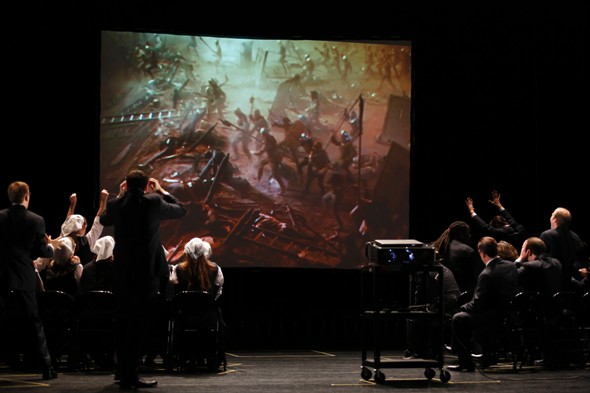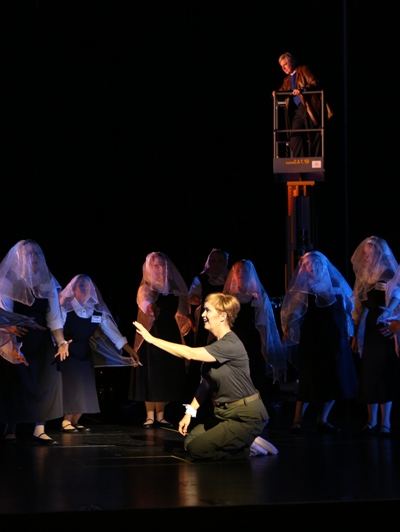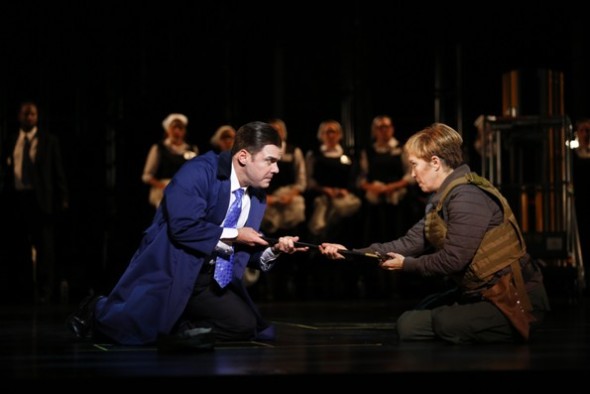Muddling the stakes, Chicago Opera Theater drives one through the heart of Verdi’s ‘Joan’
Review: “Giovanna d’Arco” by Giuseppe Verdi, at Chicago Opera Theater through Sept. 28. ★★
By Nancy Malitz
Photos by Liz Lauren
Does the middling label “lesser,” in the habitually repeated rankings of Verdi operas, give presenters a green light to “fix” things that may not be broken?
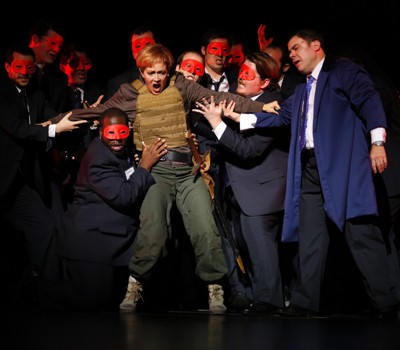 Chicago Opera Theater’s production of “Giovanna d’Arco,” helmed by director David Schweizer, fell into that trap. Fair enough that the production subsumed the Joan of Arc story into a play-within-a-play concept, so that the tale of God’s 15th-century standard bearer is enacted by a modern fundamentalist Christian sect. And fair enough, again, that the idea allowed for some low-cost solutions to massive battle scenes, which showed scenic and lighting designers Jack Magaw and Keith Parham in top form.
Chicago Opera Theater’s production of “Giovanna d’Arco,” helmed by director David Schweizer, fell into that trap. Fair enough that the production subsumed the Joan of Arc story into a play-within-a-play concept, so that the tale of God’s 15th-century standard bearer is enacted by a modern fundamentalist Christian sect. And fair enough, again, that the idea allowed for some low-cost solutions to massive battle scenes, which showed scenic and lighting designers Jack Magaw and Keith Parham in top form.
But in setting a parodistic tone for this overlay, Schweizer has blunted the impact of the opera’s great strengths — Verdi’s seriousness, his sense of human drama, the strong contours of his dramatic structure. The production mocks its subject and is at odds with the music itself.
 There is every indication that Verdi took the teenage maiden’s struggle between the sudden flowering of human desire and her virgin spiritual calling with the utmost gravity. Some of his most profound music deals with her inner battle, and with the inability of the maiden’s father or her smitten king to comprehend it.
There is every indication that Verdi took the teenage maiden’s struggle between the sudden flowering of human desire and her virgin spiritual calling with the utmost gravity. Some of his most profound music deals with her inner battle, and with the inability of the maiden’s father or her smitten king to comprehend it.
Schweizer certainly has a point that modern audiences in this secular, sexually freer age may have difficulty identifying with her torment. But one comes away from this production with the impression that Schweizer’s real difficulty is in identifying with the music itself.
Surely Verdi would not have taken it lightly that his most heart-breaking musical moments were made sport of, perhaps inadvertently, through corny gesticulations of the modern sisterhood intended to express spiritual ecstasy. Nor would he have put up with the fussing of the male “minders” who clapped their hands, shushed their sisters and hustled their movements hither and thither as if they were routing chickens in a coop, at a time when the music was psychological light years from the barnyard.
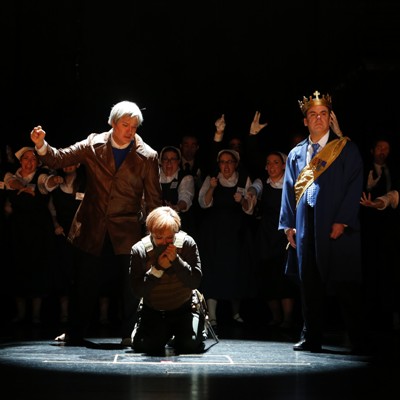 “Giovanna d’Arco” may be lesser by comparison with Verdi’s entire oeuvre, which is surpassingly great. But the mantra that “Giovanna d’Arco” is a lesser opera amounts to a put-down that sets the wrong expectation entirely. From a musical standpoint, it was a stunning achievement by the 31-year-old composer. COT conductor Francesco Milioto and his New Millennium Orchestra got that. The orchestral and vocal forces assembled under his musical direction for COT made a creditable argument.
“Giovanna d’Arco” may be lesser by comparison with Verdi’s entire oeuvre, which is surpassingly great. But the mantra that “Giovanna d’Arco” is a lesser opera amounts to a put-down that sets the wrong expectation entirely. From a musical standpoint, it was a stunning achievement by the 31-year-old composer. COT conductor Francesco Milioto and his New Millennium Orchestra got that. The orchestral and vocal forces assembled under his musical direction for COT made a creditable argument.
Soprano Suzan Hanson, who has impressed at COT before, communicated the innocence and especially the ferocity of the virgin warrior with true grit. Tenor Steven Harrison, as the overwhelmed Carlos VII, lent the troubled king an introspective modesty in the maw of his people’s crisis that suited his lyric voice. Baritone Michael Chioldi was a standout as Giacomo, Joan’s reproving father, quick to judge and soaring in remorse, and he sang it as one who has inhabited Verdi’s other great paternal roles. One could have closed one’s eyes and come away with a legitimate Verdi experience.
Schweizer gave each of the stars an alter ego in the modern sect — Joan is a shy sister who is reluctant at first to undertake her role; Giacomo doubles as the group’s leader and moral arbiter. (He’s also possessor of an effective tool for spotting the devil — his very own high hide, compliments of designer Magaw.) The choristers are first seen in the overture, as viewers of the 1948 Ingrid Bergman film about Joan of Arc, which is trimmed — not badly — to coincide with the dramatic course of the overture.
Later, the female choristers wear shimmering veils for the angel chorus and the male choristers don red party masks as emissaries of Satan in the all-out choral battle for Joan’s sorely tempted soul. (Why do modern ears insist on hearing Verdi’s fast music as light weight? The music in this haunted forest scene is terrific. But we were treated to silly masked antics from the male singers as if they were at some frat’s naughty Hell Week; pretty thin for ambassadors from Inferno itself.)
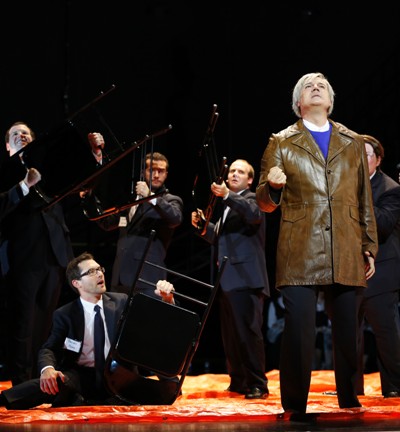 Temistocle Solera’s libretto doubtless disappointed Verdi in certain respects; he would find collaborators more equal to his own dramatic wherewithal in years ahead. But Verdi certainly knew how to shape a story through music. He knew how to end an act, for example. And to start another. One of the most distressing aspects of this production was how it tied the ending of its first act to the opening of the second by repeating a few bars of the old, like a voice-over saying “Previously, on ’24,'” followed by additional stage business that was utterly at odds with Verdi’s expression.
Temistocle Solera’s libretto doubtless disappointed Verdi in certain respects; he would find collaborators more equal to his own dramatic wherewithal in years ahead. But Verdi certainly knew how to shape a story through music. He knew how to end an act, for example. And to start another. One of the most distressing aspects of this production was how it tied the ending of its first act to the opening of the second by repeating a few bars of the old, like a voice-over saying “Previously, on ’24,'” followed by additional stage business that was utterly at odds with Verdi’s expression.
Nor was there anything in Verdi’s grand musical summation to prepare one for the jolt of Schweizer’s final fade-out. No sooner is Joan in heaven than those sweetly tempered Christians turn machine guns on the audience. Say what?
 To any lover of Verdi’s music — one who has had an opportunity to become familiar with his musical language — “Giovanna d’Arco” is a mine that’s rich with golden veins. As with “Nabucco,” “Macbeth,” “La traviata” and “La forza del destino,” it takes only a few bars of the overture before one hears Verdi zeroing in on the elements of human passion, fragility and destiny that lie at its heart. Many of his favorite themes, such as father-daughter conflicts over love and duty, are gloriously heralded.
To any lover of Verdi’s music — one who has had an opportunity to become familiar with his musical language — “Giovanna d’Arco” is a mine that’s rich with golden veins. As with “Nabucco,” “Macbeth,” “La traviata” and “La forza del destino,” it takes only a few bars of the overture before one hears Verdi zeroing in on the elements of human passion, fragility and destiny that lie at its heart. Many of his favorite themes, such as father-daughter conflicts over love and duty, are gloriously heralded.
The opera’s story line is admittedly confusing for modern listeners who know very well that Joan was burned at the stake. That doesn’t happen here. But Verdi is not the least confused about the human motivations that propel his opera’s version of the story.
“Giovanna d’Arco” was chosen through Chicago Opera Theater’s People’s Choice competition. It’s a good piece of social networking that determines one production a year. Typically lesser-known jewels by great composers have been selected — Shostakovich’s “Moscow, Cheryomushki” and Rossini’s “Mosè in Egitto” (Moses in Egypt) among them.
The choice of “Giovanna d’Arco” shows no small sophistication on the part of COT’s open, curious, youthful audience. Current productions of this same opera are now underway in Bielefeld, Germany, and Bilbao, Spain. The Warsaw Opera has done it three years running. James Levine has recorded it with Montserrat Caballé. Anna Netrebko and Plácido Domingo sang it just this summer in Salzburg.
Both the Chicago Symphony Orchestra and the Lyric Opera of Chicago have placed Verdi front and center in this, his bicentennial year, with preparations for “Macbeth,” “Otello” and “La traviata” among the significant offerings, and a free simulcast of the Requiem on the giant screen at Millennium Park on Verdi’s exact birthday, Oct. 10,by the Chicago Symphony.
Does scrappy COT belong in this grand celebrathon? Certainly. Even in an unnecessarily apologetic production, “Giovanna d’Arco” adds both musical novelty and grass-roots ambition to the overall mix of Chicago’s 200th anniversary Verdi season.
Tags: Chicago Opera Theater, David Schweizer, Francesco Milioto, Giovanna d'Arco, Jack Magaw, Joan of Arc, Keith Parham, Michael Chioldi, Steven Harrison, Suzan Hanson, Verdi

